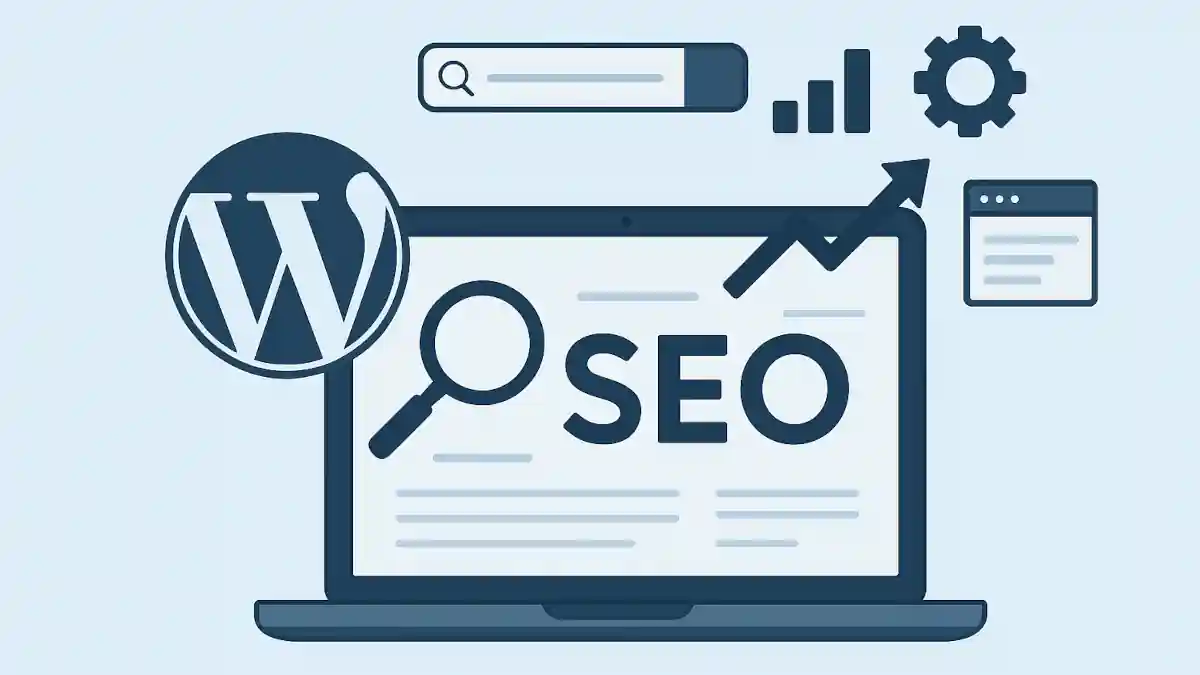Running a WordPress site but not seeing the traffic you expected? Chances are, hidden SEO issues are holding you back. From broken links to slow page speeds, these problems can quietly drag down your rankings. The good news is that most of them are easy to fix once you know what to look for.
In this guide, we’ll cover the most common SEO problems in WordPress and show you exactly how to fix them.

1. Duplicate Content Issues
The Problem
WordPress automatically creates multiple URLs for posts and categories (e.g., /category/post-name/ and /tag/post-name/), which can confuse search engines and dilute rankings.
The Fix
- Use an SEO plugin like Yoast SEO or Rank Math to set canonical URLs.
- Disable thin or duplicate archives (tags, author pages) that don’t add value.
- Add a sitemap that includes only your essential pages.
2. Slow Page Speed
The Problem
A slow-loading WordPress site leads to higher bounce rates and poor rankings, especially on mobile.
The Fix
- Install a caching plugin like WP Rocket or W3 Total Cache.
- Optimize images with plugins like Smush or ShortPixel.
- Use a Content Delivery Network (CDN) such as Cloudflare.
- Choose lightweight themes and avoid bloated page builders.
3. Broken Links & 404 Errors
The Problem
Broken internal or external links confuse both users and search engines, leading to crawling issues.
The Fix
- Use a plugin like Broken Link Checker or run scans with Ahrefs/Screaming Frog.
- Redirect broken URLs to relevant pages using a redirect plugin (e.g., Redirection).
- Regularly monitor your Google Search Console for 404 reports.
4. Missing Meta Tags & Descriptions
The Problem
Without proper title tags and meta descriptions, your site may fail to rank or attract clicks.
The Fix
- Install Yoast SEO or Rank Math to easily edit meta titles and descriptions.
- Include target keywords naturally in titles and descriptions.
- Keep titles under 60 characters and descriptions under 160 characters.
5. Poor Mobile Optimization
The Problem
Google uses mobile-first indexing, meaning if your site isn’t mobile-friendly, rankings suffer.
The Fix
- Use a responsive WordPress theme.
- Test your site with Google’s Mobile-Friendly Test Tool.
- Avoid intrusive pop-ups that disrupt the mobile user experience.
6. Not Using HTTPS
The Problem
Sites without an SSL certificate show as “Not Secure”, lowering trust and rankings.
The Fix
- Install an SSL certificate (most hosts like SiteGround, Bluehost, or WP Engine offer free Let’s Encrypt SSL).
- Use the Really Simple SSL plugin to redirect all traffic to HTTPS.
7. Poor Site Structure & Navigation
The Problem
Complicated navigation confuses users and prevents crawlers from properly indexing your site.
The Fix
- Use clear menus and logical categories.
- Keep URL structures short and keyword-rich (e.g.,
yoursite.com/seo-in-wordpress). - Add internal links between related articles.
8. Not Submitting a Sitemap to Google
The Problem
Without a sitemap, Google may not properly discover all your content.
The Fix
- Generate an XML sitemap using Yoast SEO or Rank Math.
- Submit it to Google Search Console under Index > Sitemaps.
- Ensure your sitemap updates automatically when you add new content.
9. Thin or Low-Quality Content
The Problem
Pages with very little content or irrelevant information can harm rankings.
The Fix
- Aim for 1,000+ words of useful, keyword-rich content for main posts.
- Use structured headings (H1, H2, H3) for better readability.
- Regularly update old content to keep it fresh.
10. Not Tracking SEO Performance
The Problem
Without monitoring, you won’t know which fixes are working.
The Fix
- Connect your site to Google Search Console and Google Analytics.
- Use SEO plugins to analyze keyword performance.
- Track metrics like impressions, clicks, bounce rates, and page speed.
Frequently Asked Questions
How do I improve SEO in WordPress?
You can improve SEO in WordPress by using plugins like Yoast or Rank Math, optimizing your titles and meta descriptions, fixing broken links, improving site speed, and publishing high-quality content regularly.
Which SEO plugin is best for WordPress?
The most popular SEO plugins for WordPress are Yoast SEO and Rank Math. Both offer tools for meta tags, sitemaps, schema, and more. Rank Math is lightweight and feature-rich, while Yoast has a long track record and broad support.
How do I fix SEO issues in WordPress?
To fix SEO issues in WordPress, check for duplicate content, broken links, missing meta descriptions, slow site speed, and poor mobile optimization. Use Google Search Console and SEO plugins to monitor and resolve these issues quickly.
Is WordPress good for SEO?
Yes, WordPress is one of the most SEO-friendly CMS platforms. With plugins, clean URL structures, and responsive themes, it provides a strong foundation for optimizing websites for search engines.
Do I need coding knowledge to do SEO in WordPress?
No, you don’t need coding knowledge to do SEO in WordPress. Plugins make it easy to handle most SEO tasks, such as adding meta tags, sitemaps, and schema markup, without writing code.